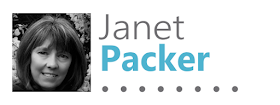Hello, Janet here with a little tutorial on how to design a sewing pattern to make this cute holder for your sunglasses (or regular reading glasses), and some information generally on using the Silhouette Studio software to make your own sewing templates. The decorative fabric used for this project was printed from the Studio software. Instructions to do that can be found here.
I regularly use the Silhouette Studio software to design all kinds of projects; from card layouts, picture placements, to sewing patterns and templates. It makes drawing to scale very simple, and I no longer need to resort to graph paper and pencil for designs of all types.
This glasses case is based on a circle with a cut away to one side. It is lined with a complementary fabric and padded with wadding adhered to both pieces. The pieces are sewn together with a sewing machine and then it is folded over like a taco (or a pasty) and hand-stitched along one side.
Here are the steps required to make the pattern for the sun glasses holder.
1. If your pattern pieces will be restricted by the size of your fabric (mine had to fit on a piece of Silhouette Printable Cotton Fabric), set your Page settings to reflect that size (Page Setup panel, Page Size tab, set as required using 12"x12" if there are no relevant size restrictions).
2. Using the Drawing Tools, draw a circle of the required size (mine just fitted the width of the letter-sized paper). Select the Ellipse shape and hold down the shift key to draw a circle. Draw a second circle for the cutaway. If your glasses are deeper than those shown in the picture, you'll need to make this circle larger. Overlap the circles as shown, with the left-hand edge of the smaller circle aligned to the centre top of the larger circle, and with a small overlap. Next time around I'd make this second circle larger and the overlap shallower, but you'll need to experiment to find a good fit for your sunglasses.
3. Now subtract the smaller shape from the larger one. To do this first ensure that the smaller circle is in front of the larger one (select it, right mouse click, select Bring to Front). Then, select both circles, open the Modify panel and select Subtract.
NOTE: 'Subtract' will remove all the overlapping parts of images that are in front of other images. Only the image that is located at the back remains.
4. Add marks to show where to leave the opening (for turning the pieces from the reverse once sewn together). Use the Freehand Drawing Tool and ensure that the two marks overlap into the interior of the circle. If you are going to print them with your printer, select them both and increase the thickness in the Line Style panel, or they will not print out. As you'll see in the next step, I chose to use a sketch pen instead, so increasing the thickness was unnecessary for me.
5. If you are going to cut your pattern from a different size of paper, now is the time to change it. I changed to 12"x12" and moved the pattern towards the centre. Ensuring that the shape and lines have different line colours, select cut by line and draw the black lines with a sketch pen, and cut the pattern piece (red line) with the regular AutoBlade on a copy paper setting.
6. Once the pattern is cutout, it can be used to cut out the plain, patterned and wadding fabrics. The marks can be transferred onto the plain fabric.
7. Attach one piece of wadding onto the fabrics and machine sew them together with right sides facing, leaving a gap between the marks. Then turn the whole thing right side out and hand stitch down one side. You'll full sewing instructions on my Crafting Quine blog here.
Bye for now,
DESIGNS USED:

|
PRODUCTS USED:

|

|










Hi, Thank you for sharing useful information
ReplyDeleteWe are providing attractive and high quality Ecommerce Portal Development services with low cost if you find more details about our Ecommerce portal design and development so please feel free to contact us.
Website Designing and Development in UK
Ecommerce Portal Design and Development
Dynamic Ecommerce Portal Designing
Ecommerce iphone App Development
USA Web Development Company